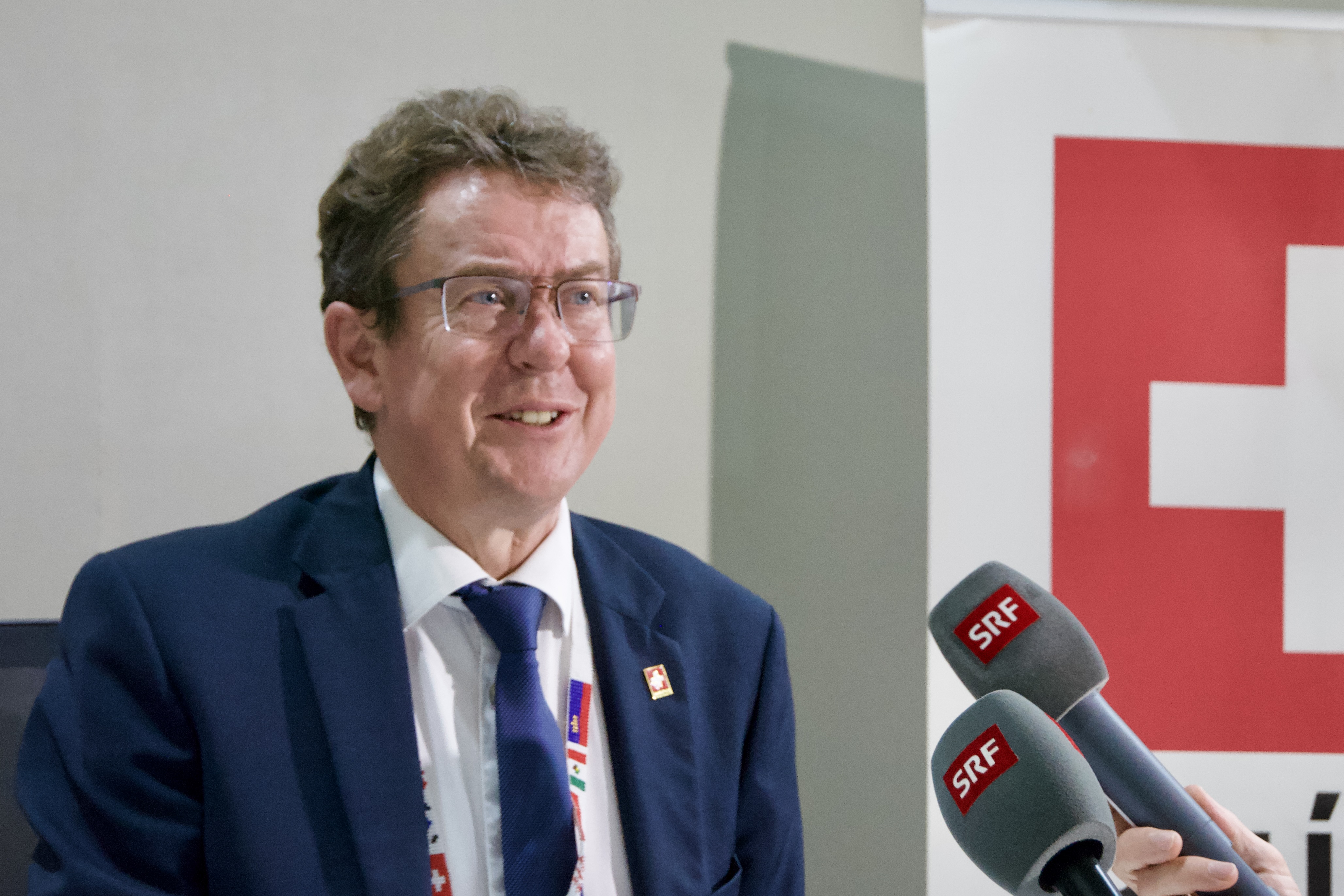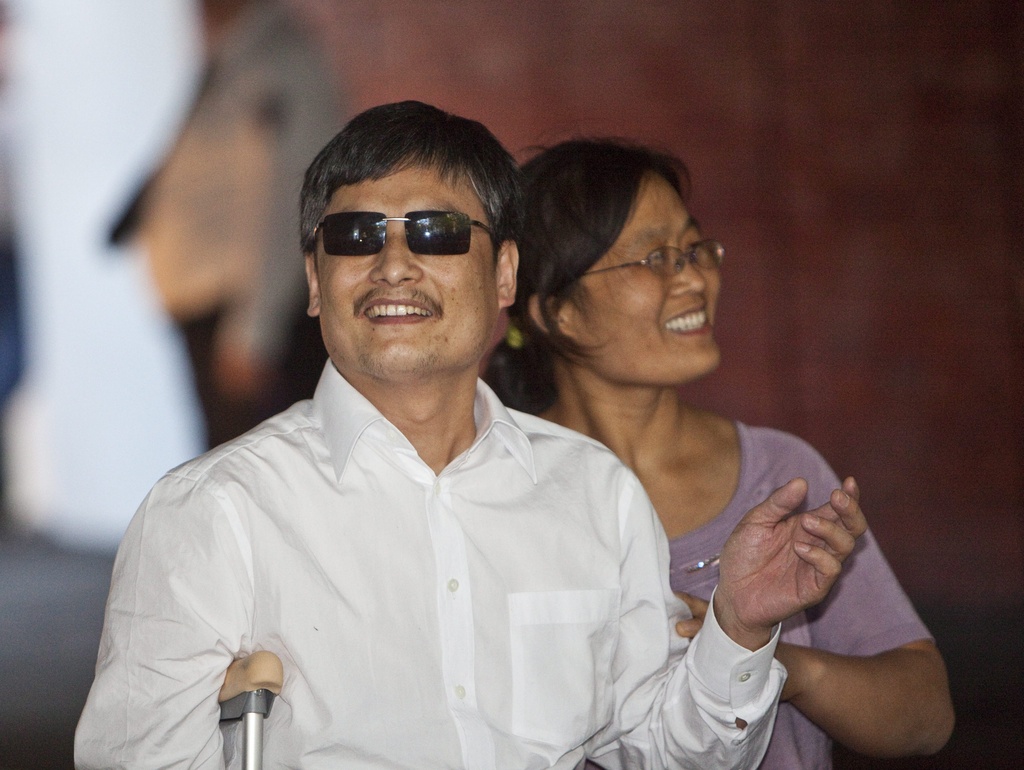
Swiss help untangle Chinese conundrum

The Swiss foreign ministry has confirmed it helped reach a positive outcome to a diplomatic tussle between China and the United States over the status of the blind Chinese legal activist Chen Guangcheng.
Chen was allowed to leave his homeland with his wife and two children on Saturday, heading to New York and ending a month-long tug of war that involved the highest levels of the Chinese and US governments.
The Swiss foreign ministry said that the bilateral solution found by the US and China was a positive development.
However, it told swissinfo.ch in a statement that it would continue to monitor the situation, adding that it was concerned for the security of Chen’s friends and relatives. It has called on the Chinese government to ensure their protection and welfare.
Chen had been taken from a hospital in his homeland and put on a plane for the US after the Chinese authorities suddenly told him to pack and prepare to leave. Shortly after arriving on Saturday evening Chen thanked the governments of the two countries, along with the embassies of Switzerland, Canada and France.
“After much turbulence, I have come out of Shandong,” he said, referring to the Chinese province where he had been held under house arrest.
The Swiss foreign ministry said it had been keeping an eye out for Chen for some time and even before the latest developments had already spoken in his favour as part of its regular human rights dialogue with the Chinese.
Different activists
The 40-year-old Chen is emblematic of a new breed of activists that the ruling Communist Party finds threatening.
Often from rural and working-class families, these “rights defenders,” as they are called, are unlike the students and intellectuals from the elite academies and major cities of previous democracy movements and thus could potentially appeal more to ordinary Chinese.
Chen gained recognition for crusading for the disabled and for farmers’ rights and fighting against forced abortions in his community. That angered local officials, who seemed to wage a personal vendetta against him, convicting him in 2006 on what his supporters say were fabricated charges and then holding him for the past 20 months in illegal house arrest.
He made a daring escape from his rural village in April and was given sanctuary inside the US embassy, triggering a diplomatic standoff over his fate. This was eventually resolved after negotiations that led to an agreement to send him to study law at New York University, something he had always wanted to do.
Chen spent the last two-and-a-half weeks in a hospital for the foot he broke escaping his house arrest. Swiss embassy officials were able to meet him there during that time, according to the foreign ministry.
“The Chen case pertains to civil and political rights as well as issues of constitutional law,” it said. “Switzerland is particularly committed to these domains.”
It added that it also intervened in favour of Chen for humanitarian reasons.
Only on Wednesday did Chinese authorities help him complete the paperwork needed for his passport, before telling him suddenly on Saturday that he could leave.
According to Chen, the US has granted him partial citizenship rights. He said that China had also promised him protection of his rights as a citizen there.
“I am very gratified to see that the Chinese government has been dealing with the situation with restraint and calm, and I hope to see that they continue to open discourse and earn the respect and trust of the people.”
Chen has said though that he was “not happy” about leaving and that he had a lot on his mind, including worries about retaliation against his extended family back home.
His nephew, Chen Kegui, is accused of attempted murder after he allegedly used a kitchen knife to attack officials who stormed his house after discovering Chen was missing.
Up until late last year, Switzerland had set up human rights dialogues with a number of countries. This diplomatic mechanism was designed to help improve the implementation of human rights policy.
They were discussions that were officially agreed with other countries and involved supporting human rights projects.
Objectives included improving the human rights situation in the medium to long term, procuring the release of political prisoners and promoting cooperation with the UN.
Dialogue subjects involved abolishing the death penalty, protection from torture, criminal prosecution and the penal system, and protecting minorities and religious freedom.
Switzerland had engaged in such discussions with China, Vietnam, Iran, Russia, Cuba and Indonesia.
However last year, the foreign ministry pulled the plug on these dialogues, with human rights issues to be diversified and integrated into “all domains” of Swiss foreign policy.

In compliance with the JTI standards
More: SWI swissinfo.ch certified by the Journalism Trust Initiative



























You can find an overview of ongoing debates with our journalists here . Please join us!
If you want to start a conversation about a topic raised in this article or want to report factual errors, email us at english@swissinfo.ch.